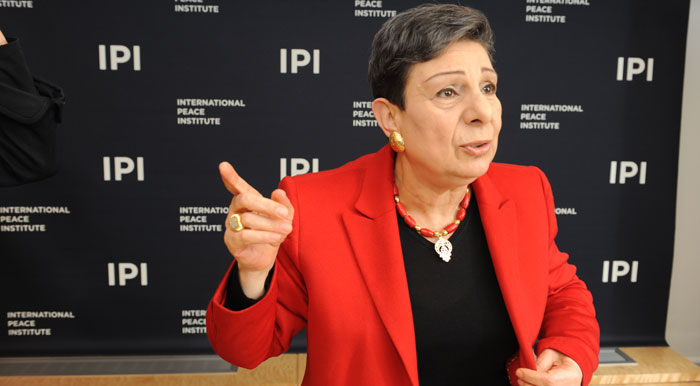
“It really is one minute to midnight. We need to make, all of us, this last ditch effort,” Dr. Hanan Ashrawi told an IPI audience on March 21, 2012, speaking about the Israeli-Palestinian peace process.
“I think we need people who can stand up and speak out,” she said. “People who understand that this is really—I don’t want to be the voice of doom, but we are reaching the end of the prospects for peace in that part of the world.”
Dr. Ashrawi said, “We need people of courage to speak out, and we need people of creativity, of imagination and intellect to devise ways of ending this occupation and put together a plan of action, not just more negotiations for their own sake.”
Dr. Ashrawi served as the official spokeswoman for the Palestinian delegation to the Middle East peace process during the Madrid peace conference in 1991. She has been an elected Member of the Palestinian Legislative Council since 1996, and a member of the Executive Committee of the Palestine Liberation Organization (PLO) since 2009. She also served as the Palestinian Authority Minister of Higher Education and Research from 1996-1998, but resigned in protest against the non-implementation of reform plans in governance and peace talks.
“The problem also with the peace process—so-called peace process—is that it gained a life of its own in many ways. It became a process for its own sake, without much substance, without applicability on the ground,” she said. “When you have a process like that, that is detached from reality, that is not influenced by behavior on the ground, it lost its credibility, it lost its support, and in the meantime, it was used as an excuse, as a cover to get Israel immunity to act with immunity and to continue destroying the substance and the foundations of peace.”
As a result, “The Palestinians always felt that they were victims of wars and occupation and coercion, and then they began to feel they are victims of a peace process.”
“The real problem is in fact there is no accountability for the behavior of the occupier and there is no real protection for Palestinians under the occupation, which meant that Israel was given enough room not just to hang itself but to hang everybody else with it.”
Palestinians, she argued, have tried all sorts of negotiations—bilateral, multilateral, indirect, exploratory. “By any stretch of the imagination,” she said, “you cannot call us uncooperative when it comes to negotiations, but along with that we have lost a lot of support, constituency support and public opinion.” It was in this context that the Palestinian leadership went to the UN to seek statehood in 2011, “in order to tell our people that there is an alternative.”
This effort was met with fierce opposition by the United States and Israel. Commenting on that, she said, “By trying to block the efforts of the Palestinian leadership at every step, they are sending a message that the voices of moderation and peace and responsibility are not listened to.” This leads many Palestinians to think that, “maybe the lesson there is that Israel listens to the voice of violence, not to the voice of peace. Maybe if you go back to armed struggle you will get results, but if you advocate peace, you won’t get results,” she said.
On the Arab Spring, she said that “It is a serious, cataclysmic change. Don’t underestimate the forces that are being unleashed in our Arab world. It has debunked many myths. The myth that the Arabs do not understand any language but the language of violence and coercion. Or the myth that the Arabs are born missing the democratic gene or they are not ready for democracy. It has also debunked the myth used by many Arab leaders that human rights are culture-specific and therefore you cannot impose on us human rights because it is against our traditions, or religion, or whatever.”
Dr. Ashrawi concluded, “The Palestinian question has always been in the Arab imagination, and in the minds of many people, not just Arabs or Muslims, people of good conscience who feel that this is the real test, not just of the leadership but of the international community, of your commitment to justice, to peace, to the rule of law.”
The event was moderated by Maureen Quinn, IPI Senior Adviser.
Interview with Dr. Hanan Ashrawi, Executive Committee Member, PLO
Watch event:







